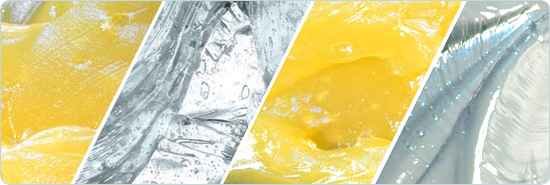- Main Clients and markets
- Customer Service
- Bearing Selection services
- Bearing Handling Service
- Bearing Fitting Service
- Lubrication Service
- Preload
-
Bearing cleanliness

Lubricating oil used for bearing is usually a highly refined petroleum or synthetic oil which has a high film strength and superior oxidation and corrosion resistance. Petroleum oils have physical and chemical properties that can help in the selection of the correct oil for any bearing application. Synthetic oils cover a broad range of categories, and include polyalphaolefins, silicones, polyglycols, and various esters. In general, synthetic oils are less prone to oxidation and can operate at extreme hot or cold temperatures.
Physical properties such as pressure-viscosity coefficients tend to vary between oil types and caution should be used when making oil selections. The polyalphaolefins (PAO) have hydrocarbon chemistry, which parallel petroleum oil both in their chemical structures and pressure-viscosity coefficients. The silicone, ester and polyglycol oils have an oxygen based chemistry that is structurally quite different from petroleum oils and PAO oils. This difference has a profound effect on reductions in bearing fatigue life and increases in bearing wear could result from this reduction of lubricant film thickness.

| Item |
Lubr- city |
Tempe- rature viscosity |
Heatre- sisting property |
Oxid- ation stability |
Rubber compa- tibility |
Remarks | |
| Synthetic oil | |||||||
| Mineral oil |
Low-viscosity mineral oil |

|

|

|

|

|
Not recommended for use at high temperatures. |
|
High-viscosity mineral oil |

|

|

|

|

|
Not recommended for use at low temperatures. | |
| Ester | Diester |

|

|

|

|

|
Excellent low-temperature performance; May swell rubber. |
| Polyol ester |

|

|

|

|

|
Performs well over a wide temperature range; May swell rubber. | |
|
Synthetic hydrocarbon |
Low and medium viscosity hydrocarbon |

|

|

|

|

|
Performs well over a wide temperature range with little adverse effect on rubber and plastics because of its molecular structure without a polar group. |
|
High-viscosity hydrocarbon |

|

|

|

|

|
However, not recommended for natural rubber and EPDM parts. |
|
| Polyglycol |

|

|

|

|
Little adverse effect on rubber including natural rubber and EPDM; Shows little electric resistance. | ||
| Phenyl ether | Diphenyl ether |

|

|

|

|

|
Excellent heat and oxidation stabilities and better anti-radiation property. |
|
Poly phenyl ether |

|

|

|

|

|
Excellent heat and oxidation stabilities and better anti-radiation property; Low viscosity index, resulting in somewhat poor low-temperature fluidity. | |
| Silicone |

|

|

|

|

|
Excellent in heat and oxidation stabilities, while somewhat poor in lubricating boundary surface of steel vs. steel. | |
| PFAE |
High-viscosity perfluoro alkyl polyether |

|

|

|

|

|
Has the best heat and oxidation stabilities among all oils available; Excellent in chemical resistance,insoluble in organic solvent, and of low vapor pressure. |
|
High-VI perfluoro alkyal polyether |

|

|

|

|

|
||

|
:Excellent |

|
:Very good |

|
:Good |

|
:Fair |

|
:Poor |




